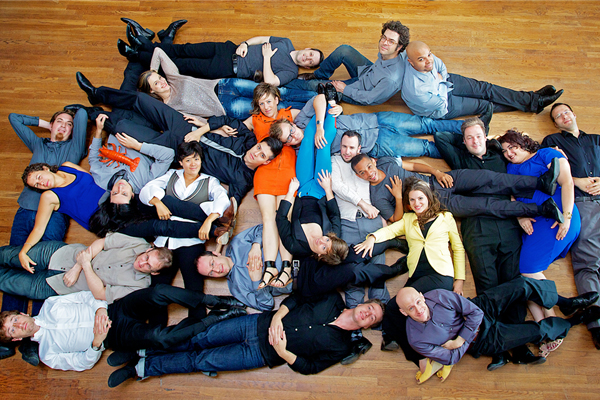
PHOTOGRAPH: ARMEN ELLIOT
Five of the International Contemporary Ensemble musicians will perform The Whisper Opera starting this weekend. Claire Chase (bright blue pants, black top, buried in the middle) talked a bit about the project.
Before you walk through the doors of the Museum of Contemporary Art this weekend, you’ll need to shed your expectations of traditional opera. Pulitzer Prize-winning composer David Lang’s The Whisper Opera—composed for International Contemporary Ensemble (ICE) musicians and soprano Tony Arnold—is a 60-minute, palm-sized experience that puts the 60-person audience on the stage with the six performers practically in their laps. In anticipation of the premiere, ICE flutist and 2012 MacArthur Genius Claire Chase sat down with Chicago to discuss the project.
So what is The Whisper Opera?
The premise of The Whisper Opera is wanting to return opera to its originally form, which was actually very, very small. Opera as we know it, it’s this grand and expensive, massive art form. It’s an experience that typically has casts of hundreds. David [Lang] and ICE were interested in creating a different kind of opera, something that could be incredibly intimate, almost disturbingly so. It’s an experience that can exist without the proverbial fourth wall.
Breaking down the proverbial fourth wall is familiar territory for ICE.
It’s something that ICE has been very interested in from the beginning. In this case we’re physically sharing space with the audience, so it’s really a new level of intimacy. The audience will sit on the set and in extremely close proximity to the performers. It’ll probably be disturbing for both performer and audience members.
What about the content of the opera? Is it narrative?
It’s totally non-narrative. There’s no story, no characters, and no traditional dramatic arc. It’s a very dramatic piece, and I think it will be deeply effective. It’s creepy but it’s also very fragile and vulnerable.
But David wrote a libretto for the piece, can you talk about that?
David complied the libretto from phrases that he googled that begin with “When I think of you I…” And what came up were all kinds of secrets that people revealed online from sweet remembrances to super creepy sexual fantasies. So the libretto becomes this series of confessions from people we don’t know to an audience that don’t know. So it becomes this really intimate, confessional space.
So 21st century opera blurs the lines of public and private and uses crowd-sourced material?
On a general level, opera is at a very interesting point right now. A 21st century opera can be anything that we make it. It does have to have singers, it doesn’t need a story, it doesn’t even require a physical space because it can exist online. The question for a contemporary music ensemble like ICE is how far can we push it.
June 1 and 2 at the Museum of Contemporary Art, 220 E Chicago Ave., mcachicago.com; sold out


